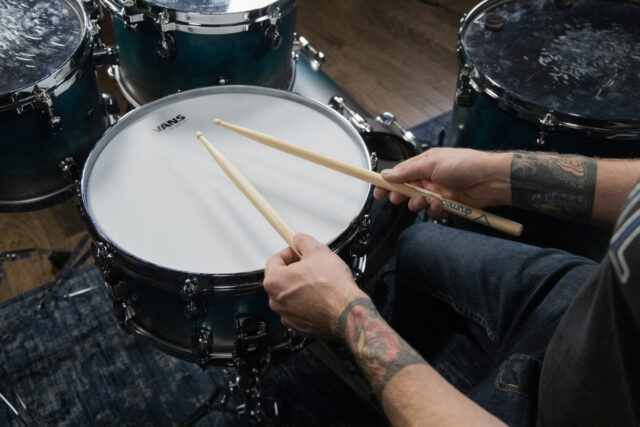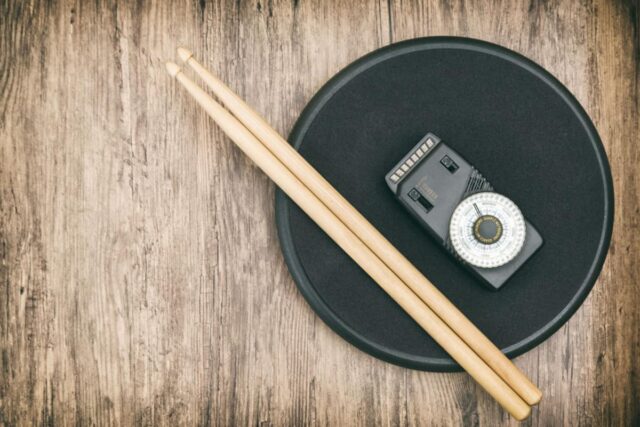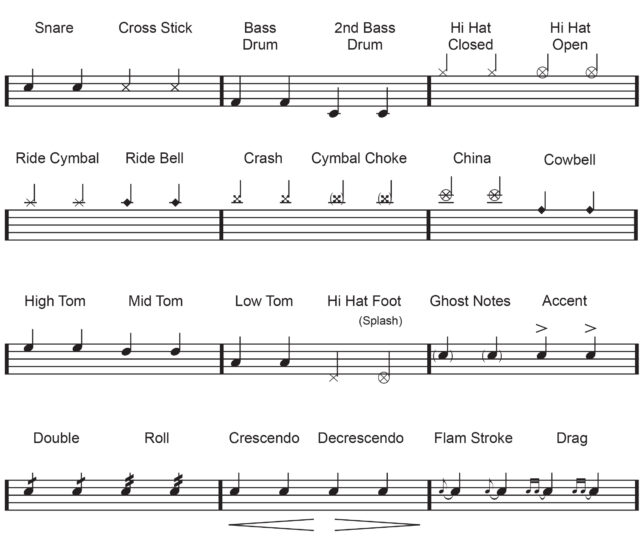Are you here because you are stuck or decided to teach yourself drums without any teacher or platform that would help? Learning to play the drums on your own can be difficult, and many challenges come along.
However, we compiled a list of the most useful tips to learn to play the drums completely by yourself and in the shortest time possible. Keep reading below to get some cool tips and tricks to help you along the way.
Learn Drums by Yourself: 9 Essential Tips

Here are the best tips to accelerate your learning process and make you a self-taught drummer.
Tip 1: Learn techniques the correct way
Learning the correct techniques is essential. Building your knowledge and skills on top of something learned incorrectly can be fatal in the future. Just imagine repeating the wrong technique for years. That’s why it is crucial to learn drumming techniques only from credible sources.
Some techniques that are a must and a foundation are:
- Holding your sticks
- Playing from the wrist
- The medium-full stroke roll
- Rebounding double strokes
- Singles to doubles exercise
Don’t try to skip these techniques, as you won’t have a proper base and fundamentals to keep learning further.
Tip 2: Use a metronome

Metronomes might be boring, but they are essential for your progress. Metronomes are one of the most important tools a drummer can have. Many metronome apps will help you along the way. However, they are not necessary. Start by playing your drums beats and fills to a metronome. If you are unfamiliar with beats and fills, don’t worry, as we will cover them below.
Practice until you feel like you are out of control with the beat, then come back to the point where you are still in control.
The point is to move the line further and practice faster constantly. If you didn’t know, timing in music is measured as beats per minute(BPM).
Push your limits, but don’t only practice fast beats because you will not develop your skills if you are always in an uncomfortable zone. The key is to push yourself, adapt, and then move forward.
Tip 3: Learn basic drum beats and fills
Learning drum beats and fills is another important aspect of your learning process. Learn basic drum beats and drum fills first, then try to progress further. Drum beats are straightforward to learn.
The same counts for drum fills, but you must know drum beats first. To learn drum beats and drum fills, here is an awesome post about learning drums where you can find everything you need about those two. These two will take some time, but they are a building block of every successful drummer, so take your time.
Tip 4: Learn the basics of drum notation

You need to know how to read drum sheet music. Most experienced and professional drummers know the basics of drum notation. That’s not the only reason you need to know it as well, but it is a sign of its usefulness. It is useful because you can pick up a drum score and start playing it immediately. In addition, getting a drum book is worth doing too. You can sit down and play from your drum notation, leading to more efficient and effective learning.
Tip 5: Learn rudiments
Essentially, rudiments are very useful and common sticking patterns and are excellent building blocks of drumming fills and beats. Single-stroke rolls, double-stroke rolls, flams, and paradiddles are the most important drum rudiments. All others stem from these four rudiments. It would be best if you learned these rudiments and trt to play them at different speeds on your practice pad.
Tip 6: Set up a routine
Routines are not just important for learning drums by yourself, but to excel in any other field too. Learning to play drums is all about practice, so setting a routine is essential. Always aim to establish when, where and how you will practice playing drums. Learning something without a plan can quickly turn into a disaster. Always have something like a practice pad or acoustic or electronic drum kit near you so you can practice anytime you want.
Tip 7: Read or watch about learning drums daily
Read, think, and apply. This is the order in which it is the easiest to learn just about anything. Try to make it a routine to update your knowledge daily. Join a drummer’s community, purchase a course, or get both of those in Drumeo Edge, one of the best sources to advance as a drummer.
Look for authoritative websites in the field, and read or watch everything you can get your hands on. Websites and youtube videos about learning to play drums are a must. Try to incorporate them into your daily routine, and you will learn 10 times faster.
Tip 8: Leverage your favorite music to learn faster

It would be best if you created your own playlists of practice music. Generally, we learn faster when doing things we like, so you need to play along with the music you love. Also, it doesn’t matter in which format the music comes. It can be anything from CDs and DVDs to cassette tapes. Whatever works for you is fine, as long as you practice with your favorite music.
Tip 9: Find a field expert and learn from him
One more useful tip is to find a person you look up to and learn from him. This doesn’t need to be in person at all. Find someone who is authoritative and worthy of your time online, and learn as much as possible from him. There are plenty of good drum teachers out there, and youtube is a great place to decide if they are the right fit for you.
After that, you can visit their website, since most of them have it, and learn from their articles. Combine reading and watching videos of your favorite drum artists, and try to learn as much as possible from them. The key here is to find a drum teacher who can pass their knowledge to you. Look for people who can articulate their thoughts and decipher complicated drum teachings into simple and digestible pieces.




